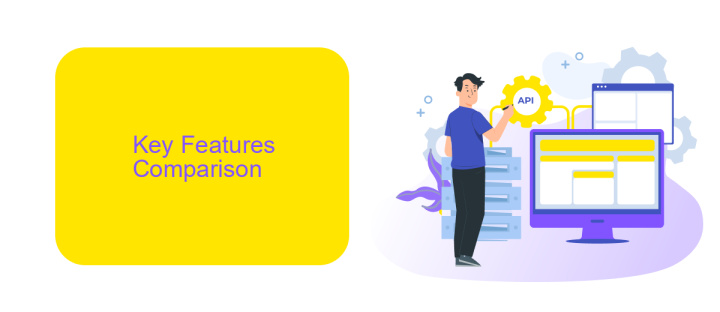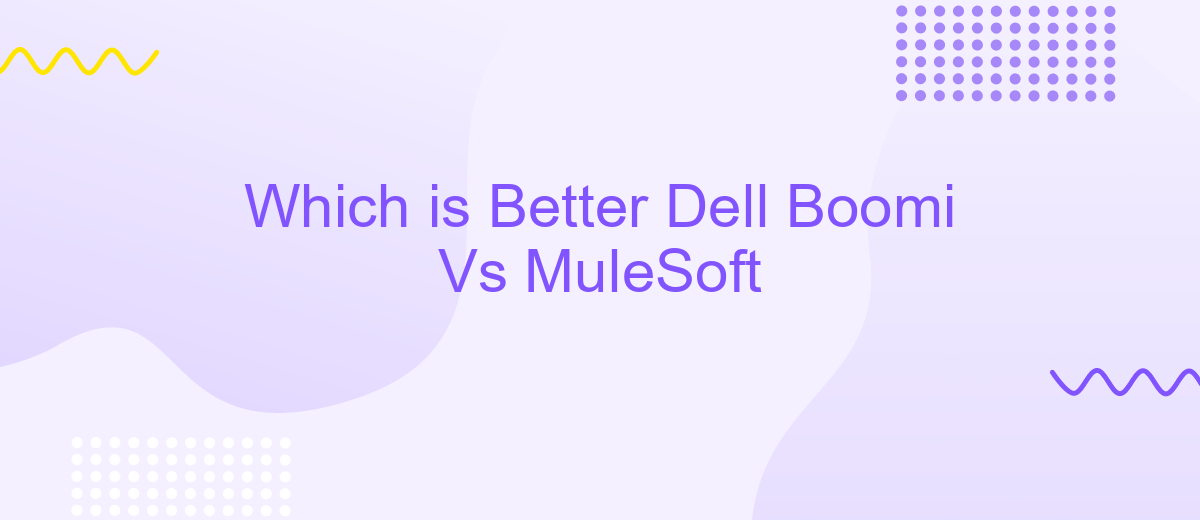Which is Better Dell Boomi Vs MuleSoft
When it comes to choosing the right integration platform for your business, Dell Boomi and MuleSoft are two of the leading contenders. Both offer robust solutions for connecting applications, data, and devices, but which one is better suited to your needs? In this article, we'll compare Dell Boomi and MuleSoft to help you make an informed decision.
Introduction
In today's rapidly evolving digital landscape, businesses are increasingly relying on integration platforms to streamline their operations and enhance connectivity across various applications. Two prominent players in this domain are Dell Boomi and MuleSoft, both offering robust integration solutions to meet diverse business needs.
- Dell Boomi: Known for its user-friendly interface and extensive pre-built connectors, Dell Boomi simplifies the integration process, making it accessible even for non-technical users.
- MuleSoft: Renowned for its flexibility and scalability, MuleSoft provides a comprehensive suite of tools for complex integrations, catering to larger enterprises with intricate requirements.
Choosing between Dell Boomi and MuleSoft can be challenging, as each platform has its unique strengths. Additionally, services like ApiX-Drive offer valuable assistance by automating and simplifying integration tasks, ensuring seamless data flow between applications. This article aims to provide a detailed comparison to help you make an informed decision tailored to your specific business needs.
Key Features Comparison

When comparing Dell Boomi and MuleSoft, one key feature to consider is their integration capabilities. Dell Boomi offers a user-friendly, low-code platform that allows businesses to quickly and efficiently integrate various applications and data sources. This is particularly beneficial for organizations looking to streamline their operations without extensive coding knowledge. On the other hand, MuleSoft provides a more robust and flexible integration platform that caters to larger enterprises with complex integration needs. Its Anypoint Platform supports a wide range of integration patterns and offers advanced API management tools.
Another important aspect is the scalability and performance of these platforms. Dell Boomi excels in providing a scalable cloud-native architecture that can easily adapt to the growing needs of a business. Its automatic scaling capabilities ensure that performance remains consistent even as demand increases. MuleSoft also offers strong scalability features, but it shines in its ability to handle high-volume transactions and complex workflows. For businesses seeking an efficient way to manage integrations, services like ApiX-Drive can be considered as they offer automated integration solutions that simplify the process of connecting different systems.
Pricing and Licensing

When it comes to pricing and licensing, both Dell Boomi and MuleSoft offer flexible models to cater to various business needs. Dell Boomi operates on a subscription-based pricing model, which is determined by the number of connectors, data volume, and environments used. This allows businesses to scale their costs according to their specific requirements.
- Subscription-based pricing model
- Cost determined by connectors, data volume, and environments
- Flexible plans for different business sizes
MuleSoft, on the other hand, also offers a subscription-based model but tends to be more enterprise-focused, with pricing tiers based on the number of users, cores, and environments. This can make MuleSoft a more costly option for smaller businesses or startups. Both platforms provide comprehensive support and updates as part of their subscription packages. For businesses looking for more straightforward and cost-effective integration solutions, services like ApiX-Drive can be a valuable alternative, offering user-friendly tools for automating data workflows without the complexity and high costs associated with larger platforms.
Benefits and Drawbacks

When comparing Dell Boomi and MuleSoft, both platforms offer robust integration solutions but have their unique strengths and weaknesses. Dell Boomi is renowned for its ease of use and quick deployment capabilities, making it a favorite among small to medium-sized businesses. On the other hand, MuleSoft is celebrated for its extensive customization options and scalability, which appeal to larger enterprises with complex integration needs.
One of the key benefits of Dell Boomi is its user-friendly interface, which allows even non-technical users to create and manage integrations with minimal training. MuleSoft, however, offers a more comprehensive set of tools for developers, enabling intricate and highly customized integrations. Both platforms support a wide range of applications and data sources, ensuring flexibility and adaptability.
- Dell Boomi: Easy to use, quick deployment, suitable for SMBs.
- MuleSoft: Highly customizable, scalable, ideal for large enterprises.
For businesses looking to streamline their integration processes without extensive technical knowledge, services like ApiX-Drive can be invaluable. ApiX-Drive simplifies the setup of integrations, making it easier to connect various applications and automate workflows. Whether you choose Dell Boomi or MuleSoft, leveraging additional tools like ApiX-Drive can enhance your integration strategy and drive better business outcomes.
Conclusion
In conclusion, both Dell Boomi and MuleSoft offer robust integration solutions, each with its own set of strengths and weaknesses. Dell Boomi stands out for its user-friendly interface and strong support for cloud-based integrations, making it an excellent choice for businesses looking for a quick and efficient way to connect various applications. On the other hand, MuleSoft excels in handling complex integrations and provides extensive customization options, which is ideal for enterprises with intricate IT landscapes.
Ultimately, the choice between Dell Boomi and MuleSoft depends on your specific business needs and technical requirements. If you prioritize ease of use and speedy deployment, Dell Boomi might be the better option. However, if your organization requires more advanced features and greater flexibility, MuleSoft could be the way to go. Additionally, for those seeking a versatile integration platform, ApiX-Drive offers a compelling alternative, providing seamless connectivity and automation capabilities to streamline your workflows. Careful evaluation of your integration needs will guide you to the best solution for your business.


FAQ
What are the key differences between Dell Boomi and MuleSoft?
Which platform is more cost-effective?
How do Dell Boomi and MuleSoft handle scalability?
Which platform offers better support for various integration scenarios?
Can I use third-party services to help with integration and automation on these platforms?
Apix-Drive is a simple and efficient system connector that will help you automate routine tasks and optimize business processes. You can save time and money, direct these resources to more important purposes. Test ApiX-Drive and make sure that this tool will relieve your employees and after 5 minutes of settings your business will start working faster.

